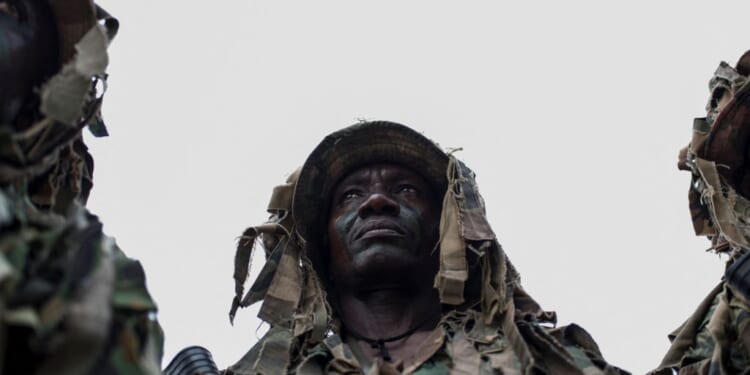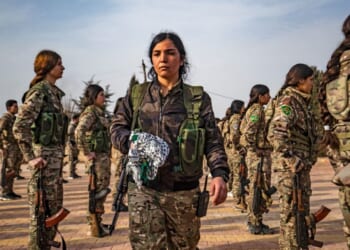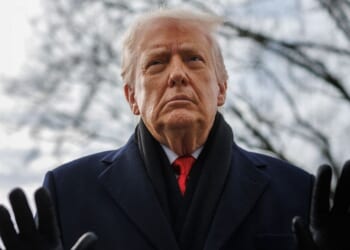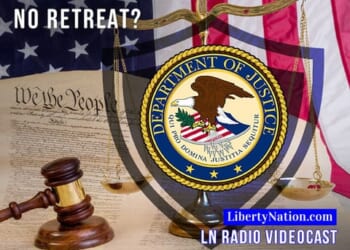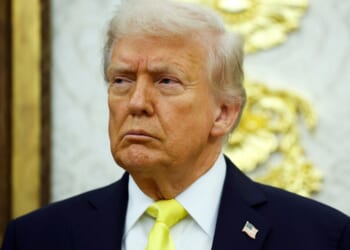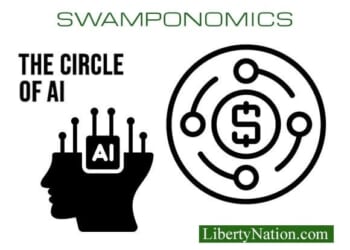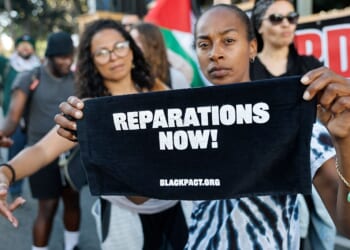The world, however briefly, has turned its gaze toward a slow-burning tragedy to which few had previously paid heed. Nigerian Christians are suffering violence at the hands of radical Islamists, and Donald Trump has ordered the Pentagon to be ready to intervene. As usual, Trump’s phrasing — his threat of going into Nigeria “guns-a-blazing” — was clumsy, provocative, and designed to energise his base rather than enlighten anyone. Threatening to cut aid to “the now disgraced country”, he wrote: “If we attack, it will be fast, vicious, and sweet, just like the terrorist thugs attack our CHERISHED Christians!”
Trump, it would seem, has detected an opportunity to enthuse his evangelical supporters. But Nigeria’s troubles are about more than Trump, American politics, or simplistic “West versus Africa” narratives. Nigeria is a state that is failing at its most basic duty: protecting its citizens.
Tens of thousands have been killed in recent years by jihadist groups and various militias. In the past year alone, thousands more have died; 3.6 million Nigerians are internally displaced — more than the entire population of Qatar. Another 400,000 have fled the violence to neighbouring Niger, Chad and Cameroon.
Whole villages have been razed, farms and schools abandoned for fear of violence. A kidnapping economy has metastasised into one of the most lucrative industries in the country; in some regions, families now expect to pay ransom as routinely as school fees. The violence is not episodic. It is systemic, grinding and national in scope. Life in vast swathes of the country is lived under constant threat.
Trump has characteristically oversimplified the crisis by framing it solely as Christians besieged by Islamist extremists. Yes, many Christians have been murdered for being Christians, in churches. But the violence is often, if not always, indiscriminate, and Muslims have also been killed in large numbers. Many attacks are driven by resource disputes and opportunistic criminality wrapped in religious rhetoric.
In Nigeria’s northwestern region alone, there are over two dozen major criminal groups whose activities involve violent robberies, the extortion of motorists, kidnappings for ransom, and illegal mining. As the African Center for Strategic Studies has noted: “Even though they sometimes call on God during attacks or while making propaganda videos, these criminal gangs do not discriminate against their targets based on religious affiliation.” For these particular groups, Islamism is more of a useful rallying cry to lure recruits than their core activity, and Muslims are just as likely to suffer violence at their hands. Moreover, considering 46% of Nigerians — 133 million people — live in extreme poverty, scarcity is a defining feature of everyday Nigerian life. This fuels a fierce competition for resources that can sometimes spill into intercommunal violence that is more driven by socioeconomics than identities. And the Nigerian government cannot, and will not, bring an end to the anarchy. Nigeria is not simply living through religious war — it is living through state abandonment.
In fairness, the Nigerian government faces immense challenges in combating insecurity. With a population of 230 million, four times that of Britain, Nigeria is policed by some 370,000 underfunded, under-equipped officers. For comparison, Britain has 170,000 better equipped officers. Nigeria’s military, meanwhile, is stretched thin, fighting jihadists and various armed militias across the country. Even the most capable government would struggle under these conditions.
Still, acknowledging these challenges does not absolve Nigeria’s rulers of responsibility. There is something revealing about the reflexive response from some Nigerian officials and Western media eager to “correct” Trump by emphasising that Muslims are also dying. The implication is perverse: that a representative distribution of victims somehow redeems the Nigerian state. That Trump is exaggerating. “Yes, thousands have been killed,” the BBC reports, “but there is no evidence Christians are disproportionately targeted.”
Imagine that logic being applied to Britain: that mass murder is somehow less of a crisis if all faiths are represented in the body count. This is the modern version of the old racist shrug: “Just the usual violence in Africa.” Regrettable but normal, nothing to get all worked up about.
The Nigerian government’s official response to Trump’s threat has been to invoke Nigeria’s “sovereignty.” The problem is not with the principle itself, but with how it is being invoked as a shield not for Nigeria’s people, but for its rulers.
It is an easy tactic: the principle of sovereignty retains a quasi-religious aura despite the sometimes questionable outcomes of its practice for regular people. It brings to mind autonomy, dignity and resistance to foreign domination. That is why corrupt elites enthusiastically exploit its emotional power to divert attention from their negligence. Sovereignty has been used as a licence for governments to neglect or, in extreme cases like North Korea, even kill their own citizens: after all, the argument goes, no one outside has the right to question what happens inside our borders. Meanwhile, the ordinary Nigerian buries children, pays ransoms, flees farms, and lives with the terrible knowledge that their government will not come to save them.
The contrast between Nigerian rulers’ rhetoric of sovereignty and their actions would be comic if it were not tragic. They decry Western meddling while sending their children to Western schools, stashing the funds they have looted in Western banks, and jetting off to Western hospitals after a sneeze. Nigeria’s current president Bola Tinubu prefers French hospitals, which he regularly visits, over those he oversees in Nigeria. His predecessor, Muhammadu Buhari, favoured London hospitals, eventually dying in one of them earlier this year. Nigeria’s rulers don’t trust Nigerian hospitals with their own care because they know they have grossly neglected and underfunded them. Where is their patriotism on this front? Can anyone imagine a French president or British prime minister jetting off to a foreign country anytime they needed medical care? What would that say about the seriousness of French or British “sovereignty” Nigeria’s political rulers, who have usually built fabulous levels of wealth through corrupt practices in politics, speak of reliance and national pride while moving around in heavily-armoured convoys that speed past the insecurity endured by the citizens they govern.
In healthy democracies, mass killings trigger reckoning — inquiries, resignations, reform. In Nigeria, they trigger wooden statements of condolence from the government and little more. Nigerians complain that sometimes even these perfunctory presidential condolences take a while coming after mass killings. The political classes accept the violence because it does not touch them. They are secure behind their layers of security. And the consequences of their hypocrisy are visible in polling that would alarm the leaders of any genuine democracy: 83% of Nigerians today say they have little or no trust in President Tinubu’s government; 82% say the same of the legislature while 79% distrust the judiciary.
“Nigeria’s institutions have been hollowed out by state capture and patronage. Elections are routinely rigged and manipulated.”
Nigeria’s institutions have been hollowed out by state capture and patronage. Elections are routinely rigged and manipulated. The system is not corrupt; corruption is the system. A democracy becomes a “shadow state” — to borrow the phrase of the political scientist William Reno — when informal power networks and elite interests override institutions. The corruption directly fuels insecurity: funds designated for counterterrorism efforts are often embezzled by senior military officials, undermining the entire exercise. In such systems, insecurity is not an aberration; it is a constant. And it is treated as a crisis only if it threatens the survival of elites.
So why, among the general indiscriminate violence, are Nigerian Christians so often attacked, with impunity, for being Christians? It is because the country’s rulers calculate that Christians are less likely than Muslims to respond to violence with more violence and large-scale violence. Conventional wisdom in Nigeria has it that the country’s Muslims, especially its more fervent faithful concentrated in the northern regions, are volatile if they perceive any threat to their faith. So, if the situation were reversed, and Christian terrorists were regularly slaughtering Muslims in Mosques, Nigeria’s government would be seriously concerned that a full-scale religious war could erupt. They would move more swiftly to apprehend the Christian attackers to placate Muslims, if only for the self-preservative motive of fearing they might lose control of the situation completely.
Nigeria’s Christians, meanwhile, are seen as less likely to respond with mass violence to attacks on them by jihadists, and so in the brutal arithmetic of Nigeria’s rulers, their killings are more ignorable. They are not seen as representing a threat to elite survival. Life is disturbingly cheap in the eyes of Nigeria’s ruling class — especially when that life belongs to the poor and the powerless. Contrary to their rhetoric, they simply do not place the same premium on human life as Western, and many other governments do. This is often the case in too many other African states.
Tinubu, Nigeria’s current president, once forfeited $460,000 to US authorities to avoid further investigation into his alleged links to drug trafficking. He once famously told his supporters, “Power is not served à la carte. Fight for it, grab it and run with it.” This is hardly the language of a guardian of noble principles. It is high time the world started distinguishing between the people of Nigeria and a political class that claims to speak for them. This is especially true if that political class often attains its positions of power through manipulated and sometimes openly rigged elections, as Tinubu himself is accused of doing. Elite sovereignty without accountability is but impunity draped in a flag.
None of this means the answer lies in American boots on Nigerian soil. Military interventions in Africa usually produce more damage than solutions. The 2011 NATO-led intervention in Libya which led to the overthrow of the government of Muammar Gaddafi and subsequent disintegration of Libya readily comes to mind. Nigerians and Africans generally are rightly allergic to paternalism masquerading as humanitarianism. But the rejection of foreign intervention cannot become the acceptance of perpetual slaughter. That is why it is good that Trump is ramping up pressure on Nigeria’s rulers to tackle insecurity more energetically. He should bring maximum pressure to bear on them in this regard, including personal sanctions. They need to believe that not acting could potentially trigger US actions that would cost them their power and privileges. Their self-preservative instincts are the only plausible pathway towards making them take action to properly fund and equip Nigeria’s security forces, curb the corruption that fuels insecurity and address the socioeconomic deprivation that makes recruitment into violent groups so easy.
Nigerians deserve the same safety as Britons or Americans. If “sovereignty” is to mean anything, it must begin with the right of citizens not to be hunted in their own homes. States do not exist to be sovereign. They exist to provide their citizens an environment that is safe and enabling of their prosperity. Sovereignty is merely supposed to be the best means to achieving those ends.
For too long, cynical leaders in Nigeria have used the language of national pride while behaving as though the state is their personal estate. They invoke the ghost of foreign domination to deflect attention from domestic plunder. Yes, Trump’s comments were self-serving. Yes, they were framed to please an American evangelical constituency. Yes, one can question why he is not considering US intervention to stop the larger-scale slaughter currently ongoing in Sudan, for instance. But to downplay Nigeria’s ongoing crisis because one dislikes the messenger is not going to help the four million Nigerians currently too afraid to return to their homes. Their suffering will not be eased by diplomatic platitudes, nor by misguided military intervention. One need not trust Trump or American foreign policy to recognise that a government not protecting its citizens should not be able to hide behind flags and slogans indefinitely. From this point of view, anyone putting unignorable pressure on the Nigerian government to finally do its job is doing a good thing.

